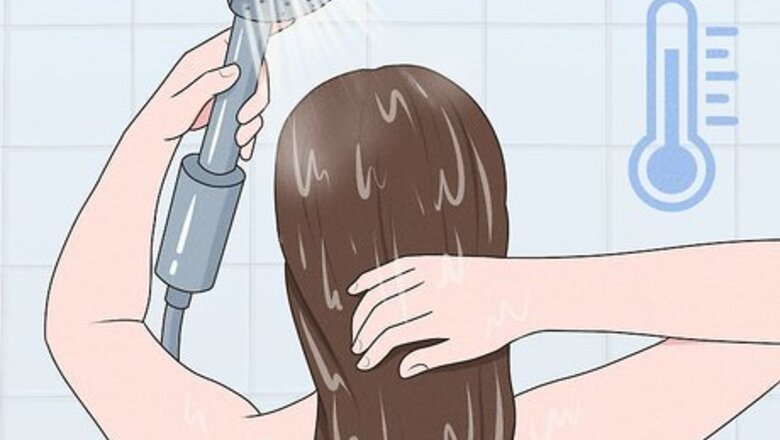
views
- Shower with warm (not scalding hot) water to avoid drying out your hair, and rinse it with cold water to minimize frizz once your hair dries.
- Air-dry your hair instead of blow-drying, as the friction from blow-drying causes frizz. Avoid towels as well; pat your hair dry with a t-shirt or microfiber cloth instead.
- Use hair treatments like coconut oil or jojoba oil to moisturize your hair, focusing on the ends of your hair and stopping halfway up its length.
- Wash your hair with sulfate-free shampoo and conditioner, and use anti-frizz products like lightweight hairspray and smoothing serum after your shower.
Frizz-Reducing Daily Habits
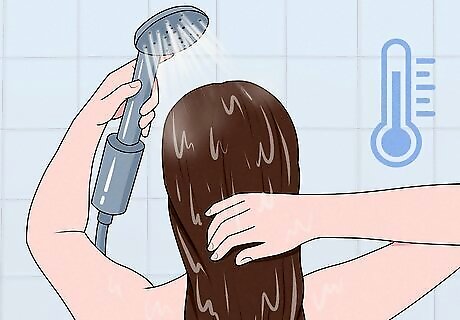
Rinse your hair with cold water after washing it in the shower. The cold water helps to close up your cuticles after washing your hair—and when your cuticles are closed, your hair looks smoother. You certainly don't need to take an entire shower with freezing water; give your hair a quick rinse in cold water at the very end before getting out of the shower. Why is my hair so frizzy? Heat is one of the biggest causes of frizzy hair because it lifts your cuticles, making your hair look fluffy. That's why countering heat with cold can help tame your frizzy hair. Try not to use excessively hot water while showering. Scalding water can pull the moisture out of your hair and dry it out. Use warm water to shower instead!
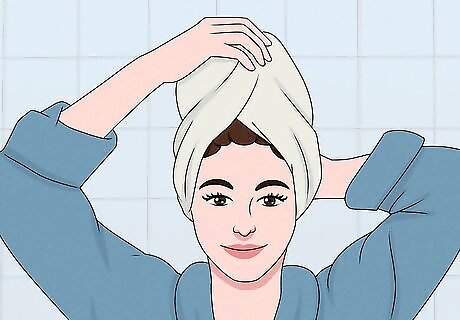
Dry your hair with a t-shirt or microfiber cloth. When drying your hair after a shower, it's best to skip the towel entirely. Instead, wrap your wet hair in a t-shirt or microfiber cloth. Regular towels create friction, causing your hair to frizz. T-shirts and microfiber cloths are gentler and will help your hair lie flat as it dries. Protect your hair from frizz caused by friction. Much like heat, friction can lift your cuticles. Thus, exposing your hair to any friction—from towels to rough bedding—makes your hair frizz up.
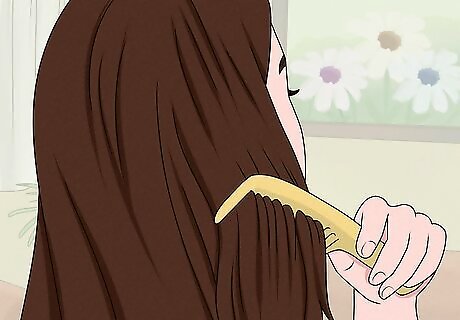
Detangle your hair while it's damp with a wide-tooth comb. Brushes and combs often create friction that can damage your hair or upset the strands. Breakage and frizzing are even more likely when using a dry brush on dry hair. To reduce frizz from brushing, use a wide-tooth comb to detangle and smooth out your hair after getting out of the shower. Prevent brush damage to stop frizz. Many brushes and combs have stiff bristles that easily snag on your hair, which causes tearing and damage. Try a detangling spray or comb through tangles with your fingers to help prevent this. Wide-tooth combs are perfect for evenly distributing conditioner and detangling. They can also be used on dry hair, but detangling will likely go more smoothly while your hair is still wet. If you need to brush your dry hair, a boar bristle brush can also be effective. Just remember that it'll damage wet hair!
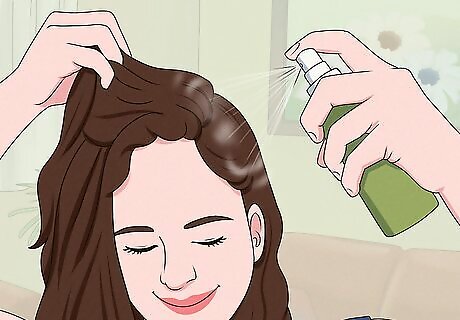
Apply styling products right after you shower. Applying styling products right after getting out of the shower can help to lock in moisture. Just be sure to wring out your hair first, or the products will not absorb. Look for products that contain polymers and silicone, which help fight humidity. Fight frizz caused by dryness. When your hair is super dry, it tries to soak in moisture from the air, which causes the hair shaft to swell. Locking in moisture with styling products can prevent frizz caused by dryness. Humidity is also a major cause of frizz for the same reasons. When water in the air enters your hair shaft, it swells, making your hair look frizzy and fluffy. For fine, wavy hair, try mousse; it won’t weigh your hair down so much. For thicker hair, try hair cream, which can hold up against thicker curls. When using products on frizzy hair, focus on the ends of each strand, working the product halfway up your hair. Applying it to your scalp may make your hair look greasy. EXPERT TIP Bianca Cox Bianca Cox Professional Hair Stylist Bianca Cox is a Hair Stylist, Licensed Cosmetologist, Owner of The Hair Throne, and Co-Owner of Bianchi Salon. Her salons pride themselves on their modernity, individuality, art, and professional services. You can check out The Hair Throne and more of Bianca's hairstyling on Instagram @hairthrone and on her personal Instagram @biancajcox. Bianca Cox Bianca Cox Professional Hair Stylist Our Expert Agrees: If you want to keep your hair from frizzing after you wash it, blot out most of the water with a towel first. Then, use a taming product of some sort, like a heavier styling cream, a hydrating cream, or an air-dry foam.
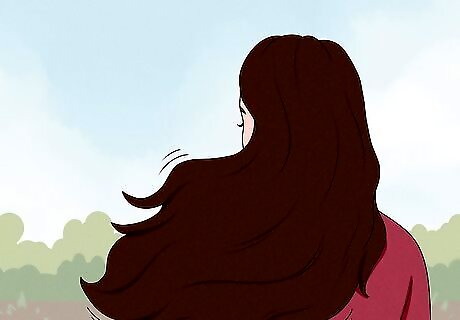
Let your hair air-dry instead of blow-drying it. Blow-drying your hair can leave it feeling (and looking) extremely frizzy from all the heat and dryness. Avoiding the blow-dryer as much as possible and air-drying your hair instead can help prevent your hair from getting too frizzy. Protect your hair from dehydration. Hairdryers can suck all the moisture out of your hair very fast, leaving it dehydrated. They also expose your hair to a lot of heat if you use a high setting, which unsettles your cuticles.
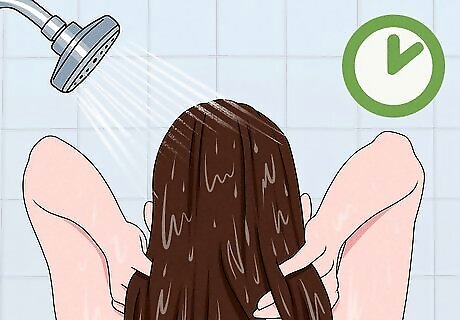
Wash your hair less frequently. Frequent washing can strip natural oils away from your hair and may cause your hair to frizz. That's why reducing frizz is possible by washing your hair less often. If you have fine hair, shampoo it every other day. If you have thicker hair, shampoo it once every 3 days. Combat frizz caused by overwashing. When you wash your hair daily, your cuticles stay open after each shower, leading to dryness and frizziness. If your hair tends to be oily (or you often sweat from work or exercise), you may need to wash your hair more frequently. Use conditioner on non-shampoo days to remove sweat and dirt and allow easy styling.
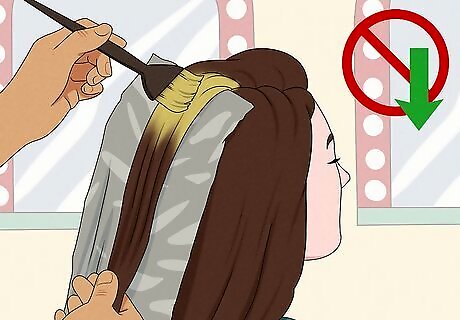
Reduce the number of chemical treatments you use on your hair. Chemical treatments like coloring, perms, and relaxers can dramatically change the texture of your hair, causing it to get frizzy. Limit how often you get chemical treatments each year to help combat this kind of frizz. Prevent frizz caused by chemical damage. Chemical treatments often cause brittleness and breakage, ultimately damaging the cuticle—and when your cuticles get damaged, that’s an automatic recipe for frizz. If you want to color your hair frequently, consider using root touch-up powders between colorings. As an alternative to chemical treatments, try wearing it in styles that allow you to rock your natural texture!
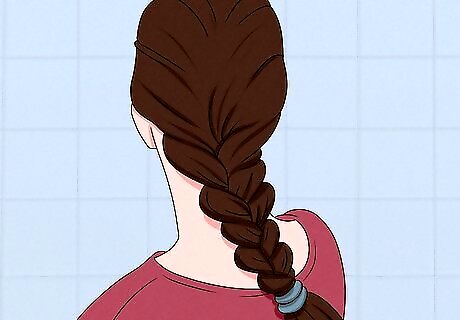
Put your hair in loose braids after getting out of the shower. To help your hair cuticles dry flat and look smoother, try tying your damp hair in a loose braid (or a couple of loose braids, if you prefer). Braids will prevent flyaways and frizz, leaving your hair sleek when it fully dries. Stop your hair from losing moisture during the day. Hair gets frizzy when it can’t retain enough moisture and dries out. Anything from harsh shampoo to dry weather can dehydrate your hair, but braiding keeps it hydrated. Be sure that you leave your braids nice and loose! Tight hairstyles can cause tension in your hair, sometimes leading to damage and breakage. If you prefer, put your hair in a loose bun instead.
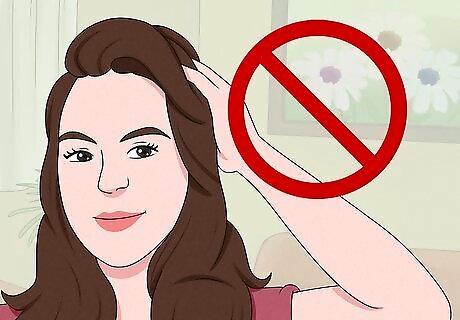
Keep your hands off your hair during the day. The more you touch your hair throughout the day, the more friction you create against the strands. As time passes, your hair becomes increasingly unsettled each time you touch it. Try not to touch your hair often, and avoid putting it up and taking it down repeatedly throughout the day. Grazing your hair can lift your cuticles. By running your hands over your hair, you're also ruffling up your cuticles—and when your cuticles are raised, your hair looks frizzier.
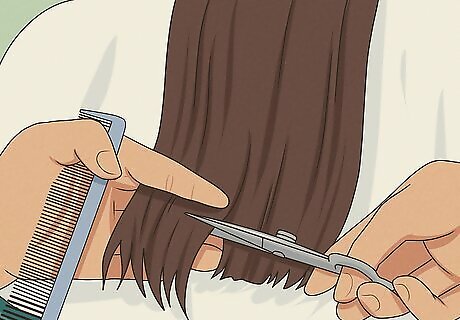
Trim your hair regularly. When you don't trim your hair for a while, it might develop split ends, which are brittle and frayed hairs split into two or more strands due. Split ends can make your hair look more frizzy and dull, so trimming your hair periodically is helpful. A quick trim can remove split ends, ensuring your hair doesn't get any more frizzy than needed. Prevent dryness and damage to your hair. Split ends aren’t the same as frizz, but they can add to the overall frizzy effect. Furthermore, split ends are caused by dryness and damage, which can also cause frizz. If you have shorter hair or your hair is damaged from chemical treatments, aim to trim it every 4 to 8 weeks if possible. Try to get a trim every 8 to 10 weeks for longer hair.
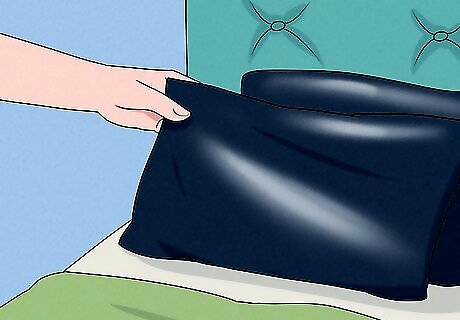
Put silk pillowcases on your pillows to stop your hair from frizzing at night. A silk pillowcase has a super smooth texture, which means there's very little friction between the pillowcase and your hair when you're asleep. Because there's no friction, your hair will lose less moisture—plus, it'll look less frizzy and mussed up from tossing and turning. Cotton pillowcases tend to snag hair and get it tangled overnight. Steer clear of rough, damaging materials. Resting your head on a pillowcase made from materials with rough textures (like cotton) pull moisture from your hair and tear it, upsetting the cuticles.
DIY Anti-Frizz Treatments
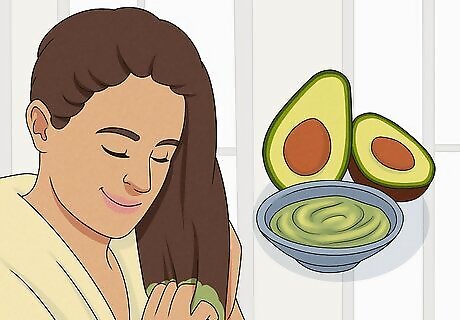
Seal moisture into your hair using a weekly avocado hair masque. Mash up 1 avocado and spread the avocado paste over clean, damp hair with your fingers—but be sure to keep the avocado masque a few inches away from your roots. If you have fine hair, you only need to apply this masque to the ends of your hair. Let the masque sit in your hair for 15 minutes, then rinse it with water. To maintain the effects of the hair masque, aim to apply this treatment roughly once per week. The oils in the avocado will naturally coat your hair and protect it from damage and humidity. It will also lock in moisture to keep it from drying out. Olive oil can also be used as a hair masque. Heat the olive oil until it's warm (but not too hot to touch) and apply it to damp hair. Wait 30 minutes, then wash your hair normally in the shower. If you'd rather not use a DIY solution, buy pre-made hair masques instead.
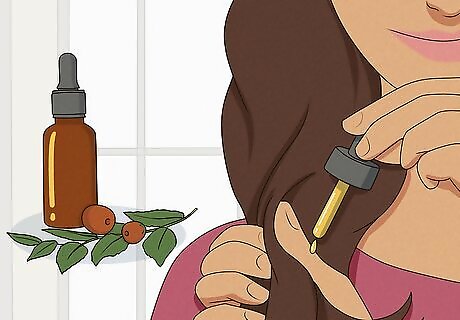
Treat your hair with jojoba oil each week to eliminate frizz. Jojoba oil is a natural plant-based oil often sold as a moisturizing hair treatment. It's very useful for frizz-prone hair and also promotes hair growth! Apply the oil to your hair, starting below your ears and focusing on the ends, where more damage is likely to occur. Keeping the oil below your ears will also prevent your hair from appearing flat. To maintain your smooth hair using jojoba oil, do this treatment once every week.
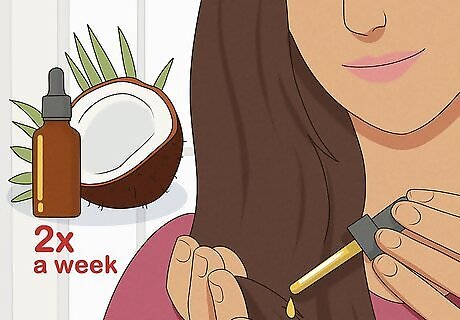
Use coconut oil to moisturize thick, frizzy hair twice a week. Coconut oil is perfect for sealing in moisture and preventing frizz caused by dryness. Apply the oil to clean, damp hair, starting at the ends and working your way up. Stop midway up your hair; applying it near the scalp will make it appear greasy. If you have thin hair, coconut oil may be a little too thick for you. Luckily, plenty of other moisturizing hair oils are out there, so figure out what works best for your hair!
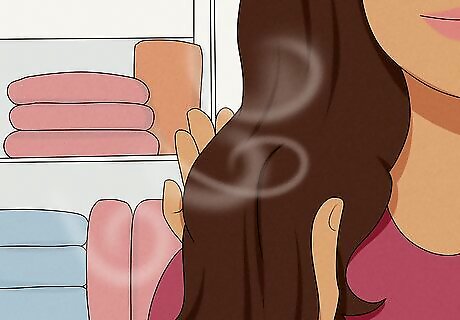
Chill your hair with cold air from a freezer to cool your cuticles. Sometimes, frizzy hair is caused by heat-styling or warm weather. To set your hair after styling it, stand in front of the freezer for a minute. This will allow your hair cuticles to cool and settle smoothly before you go outside, where your hair may be exposed to sun and humidity. If your hair dryer has a cool shot button, try it on a finished hairstyle to achieve the same effect.
Best Products for Frizzy Hair
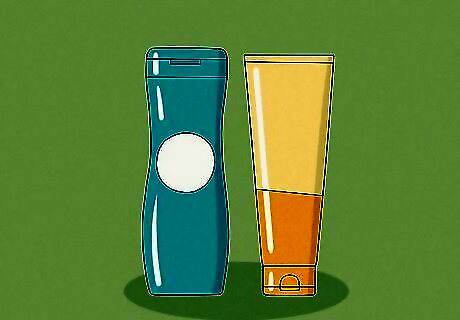
Protect your hair with paraben and sulfate-free shampoo and conditioner. Sulfate and parabens in shampoo are great at stripping away dirt and oils, but they're also incredibly harsh on hair, dehydrating it and causing excess frizz. Next time you're in the market, look for paraben and sulfate-free shampoo and conditioner to reduce the drying, frizzing effect on your hair. Look for conditioning shampoos and conditioners. Products specifically designed to hydrate your hair will leave it looking shinier and smoother after you shower. Leave-in conditioner can also be super helpful for keeping your hair smooth and shiny. Apply the conditioner immediately after taking a shower for the best effect.
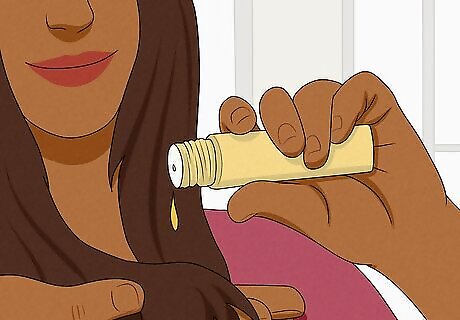
Run a smoothing serum through your hair before styling it. Hair smoothing serum controls your frizz and makes your hair look shinier, often made with nourishing ingredients like argan oil, castor oil, or jojoba oil. Work a dime-sized amount of serum through your hair to keep it looking smooth until the next time you wash it. The best time to apply smoothing serum is after washing your hair and getting out of the shower while it's still wet but has yet to be styled.
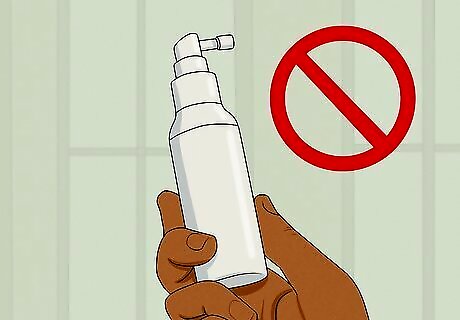
Steer clear of hair products that contain alcohol. Products with alcohol (such as certain hair sprays) damage hair because alcohol strips away moisture, leaving your hair dried out. Before you buy a hair product, check for alcohol in the ingredients list. If you spot alcohol there, find a different product. Specific alcohols to avoid include: Ethyl alcohol (ethanol), Isopropyl alcohol, and Denatured alcohol (alcohol denat). Some alcohols are safer to use. Fatty alcohols, including Lauryl alcohol, Cetyl alcohol, Myristyl alcohol, Stearyl alcohol, Cetearyl alcohol, and Behenyl alcohol won't dry out your hair so much.
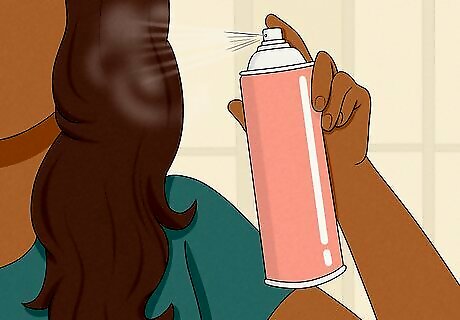
Apply a lightweight hairspray to keep flyaways in check. Spray a light coating of hairspray over your wide-tooth comb and gently brush your hair with it, paying special attention to areas that are already frizzy or have a lot of flyaways. Lightweight hairspray help get your frizz under control without weighing your hair down or making it even more frizzy.
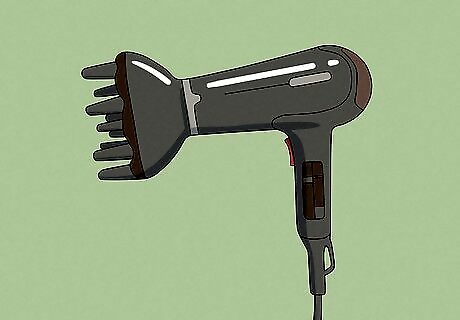
Invest in an ionic hairdryer or diffuser if you need to heat-style your hair. Use heat-styling tools like blow dryers, straighteners, and curlers sparingly since their heat can damage your hair and lead to more frizz. If you need to heat-style your hair more frequently, an ionic hairdryer is the way to go since it's designed to lock moisture into your hair. Alternatively, invest in a hair dryer diffuser attachment, which can disperse hot air and expose your hair to less heat overall, which also results in less frizz. If you're using a standard blow dryer, wait until your hair is 90% air-dried, then blow-dry the last 10% of your hair. This will help to reduce the damage caused by the heat. When using heat stylers, apply a heat protection spray to protect hair cuticles from heat and lock in moisture. This will prevent frizz and damage if you curl or straighten your hair!
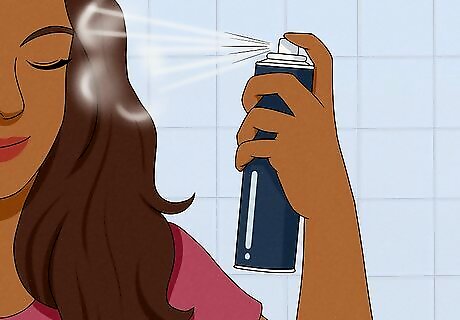
Maintain smooth hair by using dry shampoo between washes. Regular shampoo dries out your hair, and the friction from washing your hair can contribute to frizz. Try using a dry shampoo in between washes to help eliminate oil near your scalp. This will keep your hair from looking greasy on days you don't shower while also controlling frizz by reducing your need for continual washing. If you use dry shampoo too frequently, it can leave build-up on your hair, drying it out and making it frizzier. Combat this by using a clarifying shampoo on your hair once per month.
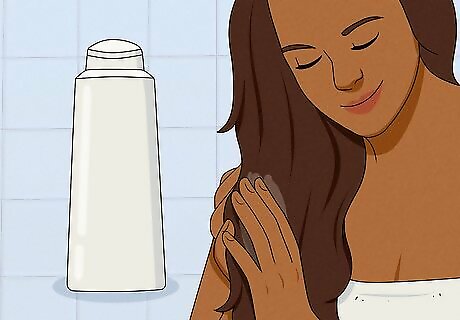
Smooth out your hair with an anti-frizz solution of conditioner and water. If your hair is prone to frizz, create a simple solution to smooth it out. Take 1 tablespoon (15 mL) of your regular conditioner and mix it with about 1 cup (240 mL) of water. Apply a small amount of the solution to the ends of your hair with your fingers. Keep this solution handy for a quick frizz fix, or make it part of your daily hair care routine! Make sure that you only apply this solution to the ends of your hair, not the roots. You can also put some of the solution in a small spray bottle to keep in a purse or bag and use as necessary throughout the day.












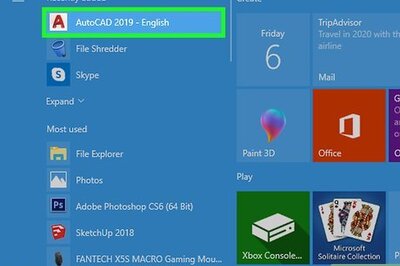

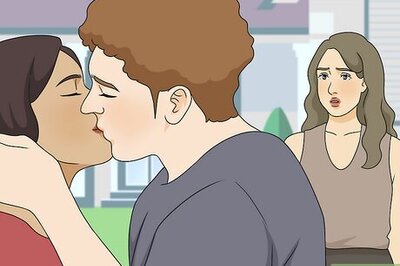
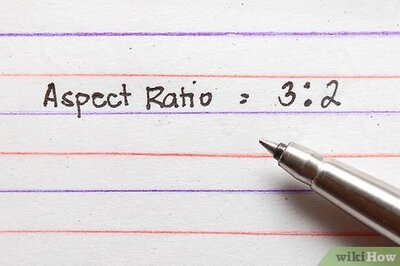

Comments
0 comment